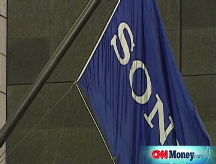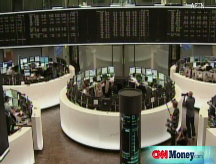Strong yen is everybody's problem
The soaring Japanese currency is causing even more concerns about a severe global economic slowdown. Can anything be done to put a crimp in it?


NEW YORK (CNNMoney.com) -- What's the big major economic worry today? Japan, come on down! You're the next contestant on The Price Isn't Right!
The yen has surged 13% against the dollar so far this month, even as the dollar has strengthened against the euro. But a stronger yen is wreaking havoc on the world markets as its feeds more global recession fears.
Japan's Nikkei fell to a 26-year low Monday, helping to drag down stocks in Europe and the United States. The Dow finished about 2.5% lower while the S&P 500 fell more than 3%.
The yen's rise against the dollar is a big cause for concern, feeding on itself because of what is known as the carry trade. Investors often borrow yen to buy other higher-risk investments. But when those investments fall in value, investors have to sell them and rush back into the yen to cover their positions.
Since Japan is such a big exporter of goods, a more robust yen hurts profits for Japanese firms as sales from abroad get translated back into yen. And that's on top of the financial pain caused by weakening global demand.
So the more that the yen climbs, the worse Japan's stock market will probably do, which tends to cause a ripple effect on European and U.S. exchanges.
"The Nikkei is heavily influenced by the manufacturers and exporters, and those are the companies that are going to get hit by the appreciation of the yen. This is very bad news for Japan," said Chris Probyn, chief economist with State Street Global Advisors.
To that end, electronics giant Sony (SNE), which will report its third-quarter results on Wednesday, warned last Thursday that profits would be lower than forecasts, mainly due to the resurgent yen and expectations of weak sales of TVs, cameras and other electronics gadgets.
Toyota Motor (TM) is also starting to feel the pinch from a weakening global economy and stronger yen. The automaker announced Monday that worldwide sales fell 4% in the third quarter, the company's first third-quarter sales drop since 2001.
And even Japanese financial firms, which were largely thought to be holding up better than many of their U.S. and European rivals, are starting to feel the strain of the credit crunch.
Mitsubishi UFJ announced Monday that it planned to sell up to $10.6 billion in common and preferred stock, news that sent shares of Mitsubishi's (MTU) U.S.-listed stock plunging nearly 14%.
Mitsubishi finalized a deal earlier this month to buy a 21% stake in Wall Street icon Morgan Stanley (MS, Fortune 500) for $9 billion and also paid $3.5 billion last month to take complete control of the San Francisco-based bank UnionBanCal (UB).
None of this is good news for the rest of the world.
"The best indicator of the future at the moment is the value of the yen. If it stabilizes, we are likely to be okay and the markets will recover," wrote Dick Bove, an influential bank analyst with Ladenburg Thalmann in a report Monday.
As such, financial leaders of the Group of Seven major industrial countries, or G-7, issued a statement Monday morning to express concerns about the yen's rise. Japan is a member of the G-7.
"We reaffirm our shared interest in a strong and stable international financial system," the G-7 officials said. "We are concerned about the recent excessive volatility in the exchange rate of the yen and its possible adverse implications for economic and financial stability."
The statement came amidst talks that the Bank of Japan and other developed nations are considering some sort of intervention to slow the yen's rally. The Bank of Japan could sell yen and buy dollars for example.
It's possible that such an action could take place in the next few days. The Federal Reserve is widely expected to lower interest rates by a half-percentage point at the end of a two-day meeting on Wednesday.
"People are trying to come to grips with just how bad the economic slowdown will be. The information is drearier and drearier every day," said Thomas Girard, co-portfolio manager for the MainStay Income Manager Fund. "The economy is weak and the Fed has acknowledged. So it has cover to lower interest rates and we think it should bring them to 1%."
There is some speculation that central banks in Europe could also lower rates as well. If that happens, investors may, at least temporarily, be willing to put money back in riskier securities, such as stocks. And that could help stall the yen's climb.
"If every other major country lowers their rates aggressively, that would help because the yen would no longer stand out as having the lowest short-term rates," Girard said.
Still, he added that intervention may not be enough to stop the yen, since so many hedge funds and other big investors still have positions to unwind related to the carry trade.
"Until that process completes itself, the yen is likely to continue to strengthen," he said.
But a stronger yen isn't completely negative for the U.S. Kurt Karl, chief U.S. economist with Swiss Re, notes that a weaker dollar vs. the yen could boost exports to Japan by making U.S. goods more attractively priced.
"This is not bad news for the U.S. in terms of its competitive environment versus Japan," he said.
Of course, if the stronger yen leads to more pain for the major Japanese exporters, one would think that would hurt Japan's economy and consumers severely as well.
And a substantially weakened Japanese economy could be troubling for the U.S., since Japan is the nation's fourth-largest export market behind Canada, Mexico and China.
So until the yen starts to stabilize, Karl predicts more short-term volatility in the markets ahead.
"The movement of currencies over the last few months has been remarkably interesting in terms of how far it's gone so quickly. And in the past, you do have huge disruptions in stock prices when these strong currency moves are underway," he said. ![]()




